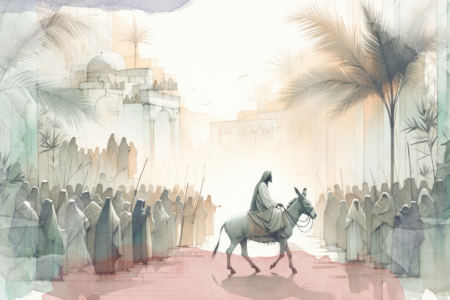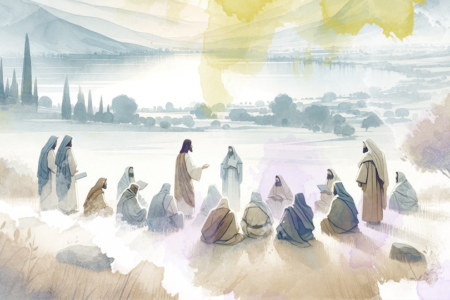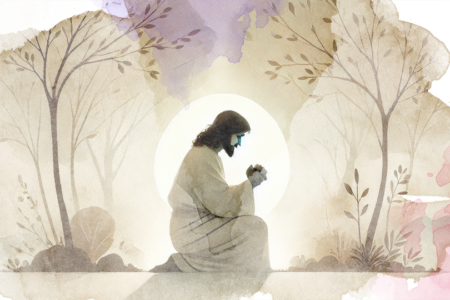The Life, Times And Message Of Isaiah The Prophet Apr/May 1975
A MAN-MADE TEMPLE CANNOT CONTAIN AN INFINITE GOD, NOR CAN THE SACRIFICE BY THE WICKED PLEASE A HOLY GOD
ISAIAH CHAPTER 66:15-24
15-17 Divine judgment upon the nations.
15 For behold the LORD shall come with fire,
And His chariots will be like a whirlwind,
To assuage His anger with fury,
And His rebuke with flames of fire.
16 For with fire will the LORD contend
And with His sword against all fiesh;
And many shall be the slain of the LORD.
17 They that sanctify themselves and purify themselves,
(To attend) the gardens, one following the other, standing in the middle,
Eating the flesh of swine, of vile things and rats,
They shall all come to an end together says the LORD.
Comment:
15-16 The wrath of God against all sinners will be manifested in fire and the whirlwind, especially against the sinners of Israel.
17 They that sanctify themselves and purify themselves (to attend) the gardens
This describes the pagan rites practiced by some apostate Jews, which were preceded by special ceremonies of “‘sanctification and purification”, performed in groves dedicated to various idols.
. . . one following the other, standing in the middle
The Hebrew text is not completely clear but seems to refer to a magic circle formed by the participants of an occult pagan rite.
Eating the flesh of swine, of vile things and rats
The eating of swine and of all the other “vile things” were forbidden to the children of Israel as an abomination (Lev. 11:7-29). The prophet predicts that they who do these things shall be destroyed (see also Is. 65:4).
18-24 The manifestation of God among the nations and their tribute to Him.
18 But (I know) their works and their thoughts,
(The time) will come when I will gather together all nations and tongues
And they shall see My glory.
19 And I will set a sign among them,
And I will send those who escaped to the nations: to Tarshish, to Pul and Lud,
Who draw the bow: to Tubal and Javan and to the far islands,
Who have never heard My name, nor seen My glory,
And they shall declare My glory among the nations.
20 And they shall bring all your brethren from among the nations,
As an offering to the LORD.
On horses and chariots, on litters and mules,
On dromedaries to Jerusalem, My holy mountain, says the LORD.
Even as the children of Israel bring their offering
In a clean vessel into the house of the LORD.
21 And also from among them will I take for priests, for Levites, says the LORD.
22 For even as the new heavens and the new earth, which I make
Shall endure before Me, says the LORD,
So shall your seed and your name endure.
23 And it shall come to pass, that from one new moon to another,
And from one Sabbath to another, all flesh shall come
To worship before Me, says the LORD.
24 And they shall go out and see the corpses of men,
Who rebelled against Me;
For their worm shall not die,
And their fire shall not be quenched,
And they shall be an abhorrence to all flesh.
Comment:
18 But (I know) their works and their thoughts
The words, “I know”, are implied. Although the ungodly may delude themselves that their works and their hidden thoughts are unknown to God, they shall be judged for them.
“The time,” another implied word, will come when God shall make Himself known to all nations.
19 And I will set a sign among them
The word, sign — “oth”, indicates a miraculous manifestation of divine providence or power. This sign will finally convince the nations that Jehovah alone is God.
And I will send those who escaped to the nations
The survivors will be the remnant of faithful Israel. Them will Jehovah send to the nations which do not know Him as yet, nor have yet seen His glory. The nations mentioned are: Tarshish, at the extreme western end of the Mediterranean, presumably Spain; Pul and Lud are North African tribes mentioned by Ezekiel (27:10 and 30:5). They were Warriors renown for their prowess with bows. These African tribes were closely associated with the Egyptians. Javan is the ancient name of Greece (lonia). Tubal and Meshech are mentioned in Ezekiel 32:26 and 38:2, 3, 39:1. These tribes lived in the area south of the Black Sea. “The far islands who have not heard My name” refers to all the nations around the east and north coasts of the Mediterranean and beyond.
And they shall declare My glory among the nations
This is Israel’s highest calling which Jehovah has entrusted to her:
“The people which I formed for Myself,
That they may declare My glory.” Is. 43:21
And they shall bring all your brethren from among the nations
“All your brethren” refers to the scattered of Israel. Israelites have lived abroad almost from time immemorial. They were the descendants of those who from time to time were carried away into slavery by the numerous invaders, or voluntarily settled abroad as traders, craftsmen, or specialists in various fields and professions. These exiles shall be brought home again by their brethren with the cooperation of converted Gentiles who will put every means of transportation to their disposal. This they will do out of love and reverence for Jehovah, the God of Israel. Parallel passages are found in Is. 60:4ff and Zeph. 3:10.
Even as the children of Israel bring their offering in a clean vessel into the house of the LORD
The bracketing together of Gentiles who believe in Jehovah with the Children of Israel indicates a new dispensation in history, the ingathering of believing Jews and Gentiles into a new fellowship, a prophetic anticipation of the Church which later became a reality through the Messiah of Israel, the Savior of Jews and Gentiles — (Eph. 2:10-16).
The motley collection of animals and conveyances enumerated in this verse expresses the eagerness of the believing Gentiles to hasten the return of the remnant to their homeland when prompted by the Spirit of God.
21 And also from among them will I take for priests and for Levites . . .
The question arises to whom does the expression “of them also will I take” apply. Some have thought that the reference applies to the formerly exiled Jews. But this would in any case be the normal privilege of the descendants of Aaron and Moses. What the prophet has in mind here is a completely new order of things: the inclusion of Gentiles in the service of the LORD, without regard to race or descent. The only condition implied is the acceptance of the LORD in faith and a willingness to serve Him.
22 For even as the new heavens and the new earth, which I make shall endure before Me, says the LORD, so shall your seed and your name endure
The survival and eternal existence of restored Israel is a basic element in the prophetic message. (Jer. 31:35-37, 33:25-26)
23 And it shall come to pass, that from one new moon to another . . . shall all flesh come
Formerly only the Israelites used to appear before the LORD, at the appointed times, according to the lunar calendar, that is, “from month to month”. But in the new dispensation not only the Jews, but Gentiles also will participate in the worship of God. Here is one of the highlights of prophetic vision: that the LORD will one day include in His kingdom also the Gentiles, without rejecting or casting away His people, Israel, as some prejudiced theologians have taught for centuries, and still do today. To such theologians, we record with sadness, belonged even some illustrious men such as Luther, Calvin and a host of others.
24 And they shall go out and see the corpses of men who rebelled . . . .
As the pilgrims from distant lands return from their pilgrimage to Zion, they shall, on their way home, look upon “the slain of the LORD”, that is, the bodies of those who rebelled against Him (verse 16).
For their worm shall not die, and their fire shall not be quenched
Isaiah probably had in mind the valley of Hinnom in Jerusalem, where human sacrifices were offered to the pagan gods, and in later times refuse was cast away, and the bodies of unclaimed, or unknown criminals were disposed of. All this was in time decomposed by worms or burned by fire (see II Chron. 28:3, Jer. 7:32, Neh. 11:30). This location gave rise to the rabbinical tradition Gehinnom, which means “the valley of Hinnom” or “Gehenna”. This is also reflected in the apocryphal books (Judith 16:17 and Wisdom 7:17), and is also mentioned in Mark 9:43-48.
And they shall be an abhorrence to all flesh
Abhorrence in Hebrew, “deraon,” is a word which occurs in the O.T. only twice, here in Isaiah and in Daniel 12:2; both in a similar context.
The sight of the decomposing bodies of the rebels against the LORD will be a horrible reminder of divine judgment to all humanity.
Because of the Jewish distaste to end the book of Isaiah on such a dismal and downbeat note, the Hebrew Bibles repeat v. 23 after v. 24, in order to end the prophecy on a note of universal hope:
“AII flesh shall come to worship before Me, says the LORD.” v. 23
Similar repetitions occur at the end of the books of Lamentations, Ecclesiastes and Malachi.
THE END







